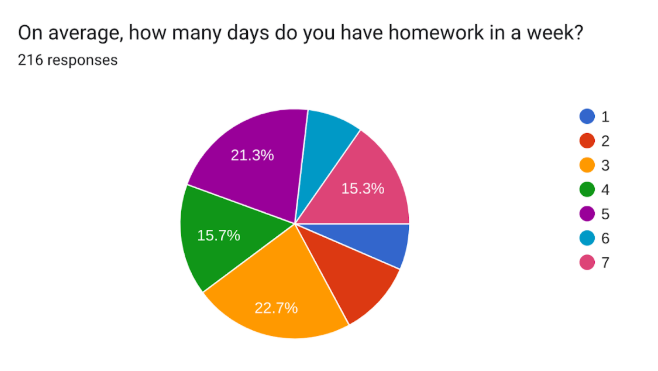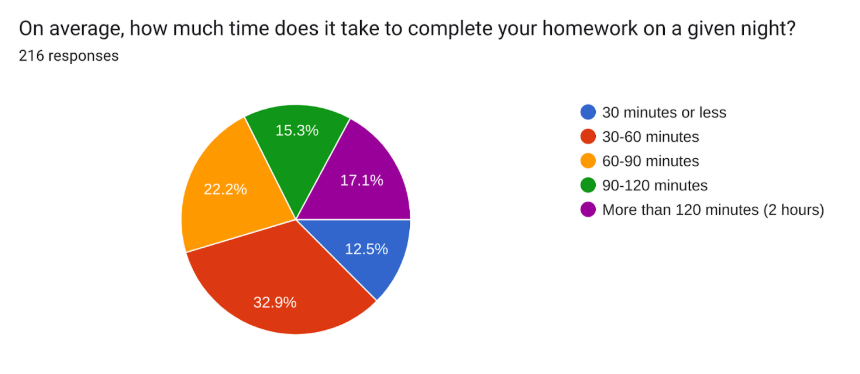Homework has long been a staple of education, serving as a tool for reinforcing lessons learned in class. However, as academic expectations rise, so does the question: How much homework is too much?
Professional Findings
Homework studies are done and released every couple of years, asking the question, is homework effective? Multiple studies have come to different conclusions, with some being supportive of homework while others say it doesn’t really have a place in schools.
Some teachers think homework helps students learn, while others say too much of it just makes kids stressed and tired. Research shows that teachers don’t always know how long homework actually takes. According to researchers, “Students spend as much as 85 minutes or as little as 30 minutes on homework that teachers imagined would take students one hour to complete.” Too much homework can also be overwhelming and doesn’t always help students do better in school. In a research paper published by Duke University states that “Too much homework may diminish its effectiveness.” Instead of giving a ton of work, some teachers believe in “quality over quantity.” Crystal Frommert, a teacher from Houston, Texas, argues that teachers should only assign “what’s necessary to augment instruction.”
The type of homework also matters. According to Johns Hopkins Magazine, repetitive homework can cause students to “get bored and just stop doing their assignments.” However, when homework is interactive and involves discussions with parents or peers, Joyce L. Epstein explains that “more kids finish their work, more kids interact with a family partner, and more parents say, ‘I learned what’s happening in the curriculum.’”
Additionally, the site Reading Rockets emphasizes that while homework can help students, “the positive relationship with student achievement diminishes” when students exceed the recommended time of “1½ to 2½ hours per night.” Research also suggests that “the amount of homework assigned by teachers is unrelated to student achievement,” while what students actually complete is more important.
The Teacher’s Perspective: Balancing Learning and Burden
Teachers play a key role in assigning homework, and their perspectives vary significantly on its necessity, frequency, and impact. Some see homework as a crucial reinforcement tool, helping students solidify their understanding of concepts, while others believe that excessive homework creates unnecessary stress.
According to our informal survey, teachers incorporate homework differently into grading. Of the teachers who responded, 33.3% assign homework as 15% of a student’s grade, while 22.2% weigh it as 20% or 25%. Some teachers emphasize that homework should reinforce concepts rather than introduce new material. “I think homework for non-AP classes should just reinforce the learning that takes place in the classroom,” Ruben Pizzaro said. “I think homework is important because it gives the student an opportunity to choose to be organized and responsible.”
How Often is Homework Assigned?
In our survey, 77.8% of teachers reported assigning homework only once or twice per week, while a small portion assigned it daily. Most teachers estimate that students should spend no more than 30–60 minutes per assignment. AP English teacher Mick Battaglini (who is also the newspaper adviser) said he tries to limit homework. “My classes have maybe 3 assignments per week, where I give them a couple of days to complete them. In total, it’s usually no more than 2 hours over the course of the week.”
Despite these measured approaches, some students still feel overwhelmed, particularly those juggling multiple AP or honors classes. “There shouldn’t be additional work to already assigned school work,” said Cecilia Campos. “Homework, when done properly, is beneficial, but it is often overprescribed and misused as ‘practice’ when it should be conceptual review,” Jared Hart said. “There is no reason homework should be complex, it should be skill practice-based and be very limited.” Junior Alexis Francisco agrees. “If the teacher is unable to reach certain aspects of a lesson, I see it as reasonable, as sometimes in class there may not be enough time. Otherwise, students shouldn’t be punished heavily due to life outside of school and overall accommodations that can be made.”
The Student’s Perspective: A Growing Workload
While teachers may be mindful of their homework policies, students often experience the workload differently. The student survey results indicate that many struggle with the volume and frequency of homework.
The chart below illustrates student responses regarding how often they have homework in a week. 21.3% reported having homework five or more days per week, while only 6.5% reported having it just once per week.
Many students expressed frustration with back-to-back assignments, especially when multiple teachers assign large projects at the same time. “It helps get the concept we are learning, but I would rather not have any,” Christopher Bautista shared. “We already have 7-8 hours in school and still have to go home to do more school-related things.”
Another major concern among students is the time required to complete assignments. While some students finish in 30–60 minutes, many reported spending 90 minutes or more per night. “I think we should focus less on the amount of homework and more on understanding the concept of the lesson,” senior Massiel Hernandez said.
Another significant issue is weekend homework, which remains a source of debate. While 33.2% of students reported receiving homework every weekend, others felt that weekends should be reserved for rest or personal activities.“Homework shouldn’t be a thing to an extent,” senior Jimmy Portillo said, “Students should have time in school to do individual work and put into practice all the things that were learned throughout the day for all subjects.”
Students taking multiple AP or honors classes are particularly affected, as they often face heavier workloads and higher expectations. This can lead to increased stress, burnout, and a lack of time for personal interests. “[Homework] Should be reduced,” senior Jeremy Elledge said. “I understand school is very important but what about our outside life? I feel it shouldn’t be so much homework to a point that we can’t enjoy ourselves.”
How Do We Find a Balance?
Given these statistics and responses, it is evident that homework is a double-edged sword—necessary for academic reinforcement but also a potential source of stress.
Here are some possible solutions: Schools could implement homework limits, setting guidelines on how much homework can be assigned per night to prevent overwhelming students. Coordinated assignments between teachers could also prevent multiple large projects from being due on the same day. Additionally, allowing more in-class work time would give students a chance to start assignments, reducing the amount they need to complete at home. Lastly, flexible deadlines—giving students a few days to complete assignments rather than requiring them overnight—could alleviate stress and allow for better time management.
Conclusion: Is There a Right Answer?
Professional studies and informal surveys both present the same idea. That homework is better used when it is given in moderation. Both the professional studies and the informal survey also highlight an ongoing challenge in education—finding the balance between academic rigor and student well-being. Both students and teachers agree that a more thoughtful approach is needed to ensure homework enhances learning rather than becoming a burden.







![Senior Jayden Duarte dives across the goal line for one of his five touchdowns in a dominant 62-40 victory over Monterey. It has been a highly successful season for Duarte, and he credits his coaches for putting him in positions to succeed and make key plays. “The goal is to help wherever the coaches need me, receiver, running back, [and] DB,” he said.](https://alisaltrojantribune.com/wp-content/uploads/2025/10/IMG_3599-2-1200x800.jpg)




















